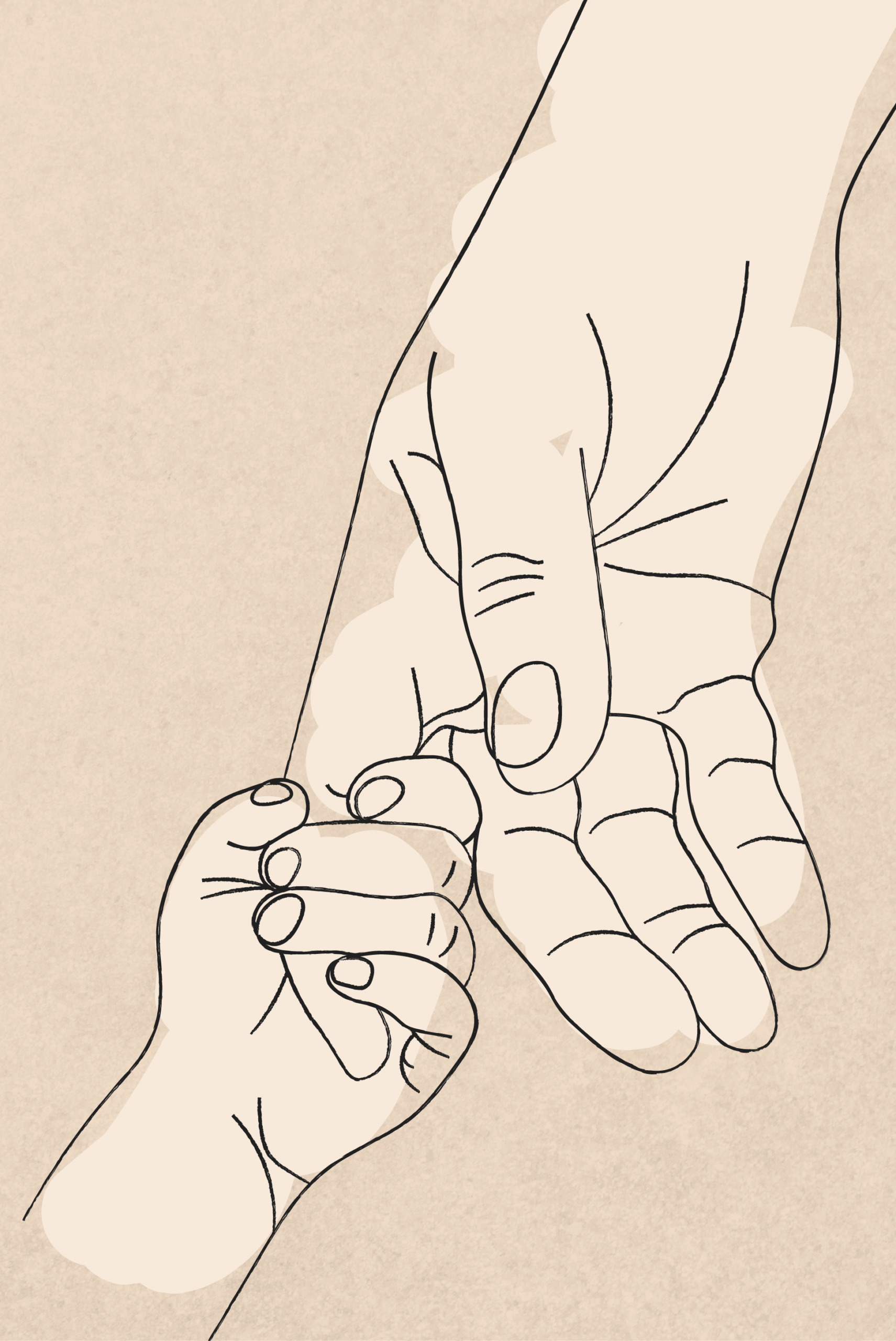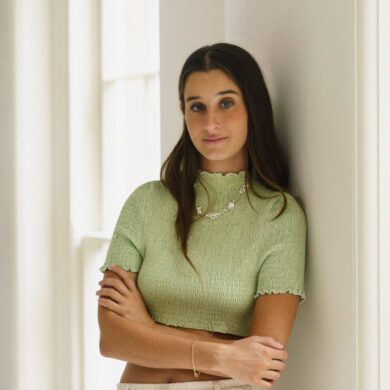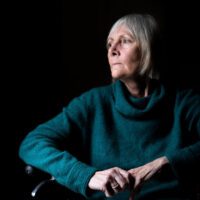On a video call from Europe, Jane* is in partial darkness. A narrow shaft of light from a window strikes one side of her face and she hunches a little towards her computer screen. She is clearly thin. Her mother in Australia has made her promise that she’ll eat properly but she has no appetite. “I feel exhausted a lot,” Jane tells me. “If I’m entirely honest, I barely cope.”
Jane, a Wiradjuri woman, is stranded on her own in the Northern Hemisphere, although she can’t reveal in which country. Jane is not her real name. Her lawyer has told her to be extremely careful about what she says publicly lest she exacerbate the horror of her circumstances.
She spends her days mostly alone, tied to her computer, waiting for the next time she can talk to her three-and-a-half-year-old daughter on a screen. She is terrified she might not see her alive again. “I live with that possibility every single day, hoping that I will see her again, but knowing that my next fight might be to just try and get her body transported back to Australia so I can bury her on her Wiradjuri grounds.”
If I’m entirely honest, I barely cope
Jane’s daughter, we’ll call her Edith, lives with her father, Jane’s ex-partner, a 30-minute drive from a little flat Jane has rented. Beyond their video chats, Jane hasn’t seen Edith for nine months. She hasn’t touched her daughter, hugged her, held her, in nine months.
In late 2022, a hearing in the Family Court of Australia ordered that Edith’s father could take her back to his Northern Hemisphere country, despite Jane’s claims that their relationship was abusive and even though Edith has Australian citizenship.
In the weeks before the court order, Jane’s ex-partner was served with an apprehended domestic violence order (ADVO) prohibiting him from going near her or Edith. “He wasn’t allowed near my house, near my work, wasn’t allowed near Edith’s playgroup, wasn’t allowed near her music lessons.”
But neither the existence of the ADVO nor other evidence presented to the court about her ex-partner’s abuse swayed the court, which heard the case under the 1980 Hague Convention on the Civil Aspects of International Child Abduction.
This little-known treaty – an agreement between Australia and close to 100 other nations – was designed to protect children from international parent abduction (say, if an overseas-born father living in Australia with his partner and child took the child to his home country, against the mother’s wishes).
He wasn’t allowed near my house, near my work, wasn’t allowed near Edith’s playgroup
But too often, this international law has had an unintended consequence: it has been used against women fleeing situations of domestic violence with their children.
“In the current application of the Hague Convention, a child can, and is, returned in many cases to their abusers … this, as any other form of violence against women and girls, cuts across institutions and rights and conventions,” United Nations special rapporteur on violence against women and girls, Reem Alsalem, said in an address to the UN Human Rights Council in June.
But momentum to address the perversities embedded in the treaty is gathering.
In October last year, a group of lawyers, academics, domestic and family violence (DFV) professionals and mothers launched the Hague Mothers Legacy Project, with the aim of amplifying the voices of women like Jane, as well as lobbying to address the Convention’s injustices. Based in the UK, US and Australia, these women are bringing their expertise to bear on what must be one of the thorniest legal issues: how to change an 53-year-old international treaty so that it protects the rights of vulnerable mothers and children.
So far, more than 37,000 people internationally have signed a Protect Hague Mothers petition. Meanwhile, 90 international experts have put their names to an open letter calling for state parties to end the unintended consequences of the Convention. This letter has been submitted to the Hague Conference ahead of a “special session” on the Child Abduction Convention this Tuesday (October 10) in The Hague in the Netherlands.
According to Hague Mothers, an interim reply from Dr Christophe Bernasconi, the Secretary-General of the Hague Conference on Private International Law, was “very positive”. Dr Bernasconi has offered to meet with representatives of Hague Mothers and agreed to circulate the letter. His reply noted that the issue of domestic violence would be on the agenda for the Hague session.
In the current application of the Hague Convention, a child can, and is, returned in many cases to their abusers
To understand why any court would order that a child should be taken from a mother and returned to an alleged abuser in another country, it’s necessary to look at the origins of the Hague Convention.
When it was drafted in 1980, it was thought that international child abductions most commonly occurred when men – often wealthy men – were unsuccessful in custody battles. The Convention was designed to enable children to be found quickly and returned to their mothers.
But according to Miranda Kaye, an academic in the Faculty of Law at UTS in Sydney, who is a member of Hague Mothers’ international steering group, the authors of the Convention didn’t think about what unintended consequences it might have – “that in fact, it was going to be women fleeing”.
In 1980, society had little understanding about the complexities of domestic violence and coercive control. While the numbers of Hague abduction matters heard in Australia are fairly small – around 100 cases a year – it’s estimated that DFV is a motivating factor in about 70% of abductions by custodial mothers. Yet nowhere in the Convention is there a single reference to domestic violence or coercive control.
As Jane knows now, coercive control can present itself slowly over time. “In hindsight I’d change a thousand things.”
She was living in Australia when she fell pregnant to her foreign-born partner. He had promised he would live in Australia with her and she had booked herself into a local Australian hospital for the birth. But she says her ex-partner’s behaviour became increasingly unpredictable and, when she was seven months pregnant, he coerced her to travel to Europe with him.
Jane claims that, after the judge made the order that Edith should be returned, mother and daughter were separated and, in another room in the Department of Communities and Justice Office, Jane could hear Edith screaming for her. “I said to the department of community services worker, ‘this is trauma!’ and the woman said, ‘of course it is, I know it is’.” Edith flew out of Australia with her father on Christmas Day.
It’s estimated that DFV is a motivating factor in about 70% of abductions by custodial mothers
Jane left behind all her support systems in Australia and travelled to her ex’s home country to be closer to Edith but, after she arrived, he took out a court order preventing her from going near her daughter. Instead now, every second morning, he permits her to have a video conversation with her.
Every time it is traumatic. Jane claims to have seen Edith with a bloodied injured lip, a bruise on her forehead and a swollen neck. She says her daughter, screaming, has said things to her like, “he hit me, he hit me, he hit me hard”, and “Mummy, Mummy, where am I, what is this place Mummy, I need to come home …” The little girl allegedly told her mother that her father had said he would fling her into the sea and then she would be dead. When Jane has taken her concerns to police in the country where she is trapped, they either dismiss them or say they’ll investigate her concerns. “But things move so slowly here.”
Jane says that, sometimes during her video calls with Edith, her ex-partner walks around in his underwear in the background. He’s loud and tries to distract his daughter from the video calls. The moment Jane manages to get Edith happy, he’ll interrupt. For Edith’s birthday recently, Jane iced cupcakes while Edith watched – “we always used to cook together”. When Jane said it was time to light the candles and sing happy birthday, her ex-partner tried to shut down the call. “He’s still controlling me, even over video he’s still controlling me.”
Jane describes the perpetual state of trauma she’s experiencing as “court-enforced abuse”. “Our children are given as a gift, gift-wrapped by our own governments to our abusers, and it’s their final act of abuse.”
He’s still controlling me, even over video he’s still controlling me
For women like Jane, the stakes couldn’t be higher, for themselves and their children.
In July 2008, Hajrudin Hasanovic dragged his estranged wife, Cassandra Hasanovic, out of her car on a street in Bognor Regis, West Sussex, and stabbed her to death in front of their two little boys and her mother. In the weeks leading up to her death, Cassandra had told her family that she knew he was going to kill her. According to a story in The Guardian, she had said she was “unravelling with fear”.
For years, Cassandra Hasanovic had been terrified of her husband and, in 2007 after he sexually assaulted her, she fled with her children to Sydney where she had relatives. But Hajrudin Hasanovic triggered a Hague application for the children to be returned to the United Kingdom and an Australian court ordered they be sent back. Hague Mothers believe the Convention cost Cassandra Hasanovic her life.
“I think this story is so powerful in revealing the deadly effects the Hague Convention can have on women,” says Dr Gina Masterton, a Brisbane-based lawyer and Queensland University of Technology academic who has her own experience of the Convention.
While working as a lawyer, Masterton was asked to help a woman who wanted to bring her child home from overseas, where she had been living with her husband.
“I immediately knew that this was going to be a problem,” says Masterton. About three months after the woman’s arrival home, she was served with court documents for a Hague access application. “I’d been a lawyer for about 13 years at that time. And I’d never even heard of The Hague Convention until [that point],” she adds.
In the weeks leading up to her death, Cassandra had told her family that she knew he was going to kill her
Masterton immersed herself in researching the intricate details of the Convention. Eventually she would complete a Masters degree on the Hague Convention and its effects on women and children. She would learn that the Convention has been strictly applied ever since it came into force in Australia in 1987 and there have been very few cases where a woman has successfully defended a Hague application by demonstrating what the Convention describes as a “grave risk of harm” exception.
This provision – the Article 13(1)(b) exception – states that a member state “ … is not bound to order the return of the child if the person, institution, or other body which opposes its return establishes that there is a grave risk that his or her return would expose the child to physical or psychological harm or otherwise place the child in an intolerable situation”.
Masterton has previously detailed one of the very few cases where a woman used the “grave risk of harm” defence and it was successful. The case involved a Greek-Australian woman who had lived with her violent husband in Greece for several years. Eventually, she fled to Australia and was served with a return application under the Convention. But her lawyers were able to establish that her husband’s abuse had been so extreme that it had left her with brain damage which caused seizures and vertigo and the court accepted the “grave risk of harm” defence, allowing her to remain in Australia.
Yet in another case heard in the Family Court in Brisbane a couple of years ago, a woman served with an order to return her five-year-old son to a South American country failed to prove the “grave risk of harm” defence, despite clear evidence that her husband ran a drug cartel, was a violent criminal, and she had domestic violence orders against him. She and the child returned to South America. Masterton hasn’t heard from the woman since. She wonders if they’re safe.
“You can come with boxes of evidence showing that if you return, if your child’s returned, that physical harm could occur, and yet the courts will be so reluctant to not make a return order. I was just flabbergasted after that case,” Masterton said.
According to Kaye, women arguing against Hague orders are so rarely successful because the Convention’s very raison d’etre is to return children. “[As far as the courts are concerned] in a Hague matter a good decision is a return decision, because that is complying with the Convention,” Kaye says. “When they do the reports to the Hague on ‘how have we gone this year’, it’s very much ‘we returned this number of children’.”
According to Kaye, women arguing against Hague orders are so rarely successful because the Convention’s very raison d’etre is to return children
Anna Kerr, founder and principal solicitor of the Feminist Legal Clinic in Sydney, believes women and girls need to be told early the implications of relationships with men who are citizens of other countries. “Once they’ve fathered their children, there is no escape,” Kerr says. “I think very few women realise that when they conceive a child, they are potentially giving up many human rights, including freedom of movement. Until that child is grown up, their lives may be ruled by the man who impregnated them… many women underestimate the extent to which their lives are going to be controlled in this way.”
The financial penalty
Kaye explains that Hague legal procedures vary from country to country but, in Australia, the application is not brought by the father but instead by what is described as “the central authority”, the state or territory in which the child is currently located. While Australian family law is federal law, for the purposes of Hague matters, in New South Wales, the Department of Communities and Justice (DCJ) acts as the central authority.
As a result, the fathers do not have legal bills and “have the might of the state behind them”, while the mother is “on her own” and, as the respondent, is required to cover her own legal expenses or apply for legal aid.
Jane thinks her legal bills so far have come to more than $150,000
Frequently, their families take out loans or draw on their super to cover legal bills. Jane thinks her legal bills so far have come to more than $150,000; a GoFundMe account has run dry so now, she’s relying on family members and friends to pay for her legal and living expenses. She’s had to leave her work at an Australian university so her career has been sabotaged as well as her finances.
A step forward
After decades of inaction, there are signs that – in Australia at least – there is increasing acknowledgement of the flaws in the Hague Convention. In December 2022, the Attorney-General, Mark Dreyfus, announced amendments to Australian legislation that addresses the Convention to make it clear that allegations of DFV can be considered under the ‘grave risk’ defence before return orders are made.
Yet experts like Miranda Kaye and Gina Masterton say the amendment does nothing to address the systemic inequalities in the Hague system.
They point to the fact that, even though DFV is not specifically mentioned in the Convention, judges always had the scope to consider it. “If you were a decent judge, you were doing that anyway, or should have been; I’m not sure it actually changes things enormously,” says Kaye.
And they take issue with the strength of the amendment’s wording. In four notes added to the regulations the word “may” is used, as in, for example, “the court may have regard to any risk that the return of the child under the Convention would result in the child being subject to, or exposed to, family violence…”. Adds Masterton: “It doesn’t say they must seriously consider it or they cannot return a child if there’s significant DV evidence. But I’ll take it because it just goes to show that they can change it if they want to, and they can change it pretty quickly.”
Kaye says it’s unclear why the word “must” was not used instead. But she also finds an upside: the amendments don’t demand that a respondent has to prove each instance of violence in order for family violence to be considered. “Which is so important, because it’s almost impossible to prove,” she says.
Given that more than a hundred countries with different types of legal systems are signatories to the Convention, amending its central document will be a Sisyphean task. That’s one of the reasons Masterton has devoted her energies to trying to change the Australian legislation governing the Convention. “I’m trying to get [the law] changed here in Australia, because the Attorney-General can do it like that. And if we start here, then New Zealand might do it, and then Canada might do it. And then other Western countries might follow. Because getting it done at the Hague, that would be a lot.”
Amending [the Convention’s] central document will be a Sisyphean task
Masterton flies to the Netherlands next week and will be among a group of women who will stand outside the HCCH headquarters in the Hague and hand out flyers to delegates arriving for the “special session” on the Convention.
Masterton’s efforts are no longer for her own client, whose husband eventually relented and allowed his child to stay in Australia. Others have not been so fortunate. Hague Mothers believe many women have seen no option but to return to abusive relationships, just to stay close to their children. Other custodial mothers separated from their children live with daily trauma and distress. They sit in tiny apartments or women’s shelters, perhaps getting some access to their children if their former partners allow it, perhaps some video contact, perhaps no contact at all.
The second time I speak to Jane, she tells me she has just had a message from an Australian woman trying to stay near her child who was returned to the father in the Middle East. The woman has been living in a woman’s shelter with her toddler but a judge has just given the father full custody. “A man who put glass in her food and tried to push her out of a four-story window.”
They sit in tiny apartments or women’s shelters, perhaps getting some access to their children if their former partners allow it
Jane has moved her laptop to a different place in her little flat with a new backdrop. It is clearly the spot she sits when she has her video calls with Edith. On a chair is a baby doll and a rag doll. Stuffed animals, a chimpanzee and a bumblebee, are perched on a shelf behind her. A paper cut-out of a clock with paper hands and rough hand-drawn numbers, the sort a mother might make when teaching a child the time, is pinned to a wall. A mother’s adaptation to extraordinary circumstances.
Jane divides her time between preparing for court appeals in the northern hemisphere country, making a quilt for Edith, and advocacy – she is involved with “Her Hague Story” on Instagram and Facebook. She is, she says, mostly numb. “After you are Hagued, it’s just about survival.” Soon she will have visa issues which might mean she needs to leave the country. She doesn’t know what the future looks like. “The only way I can justify this trauma is to continue to push for legislative change so that this doesn’t happen to others.” She firmly believes that Edith is now part of the stolen generation. “To be sent away off-Country as a First Nations child is intolerable. These are grave violations of human rights.”
Suddenly, Jane remembers something she wants to say, and takes a moment to check a file on her computer. She replays the recording she took on Edith’s birthday and studies the point at which, attempting to make a happy memory for her daughter, she told her they would sing ‘happy birthday’ and then she should pretend to blow out the candles on the cupcakes. After Jane pushes her ex-partner to allow the celebration to continue, Edith moves close to the computer screen, then shakes her head to indicate “no”. She steps away. “I’m here. I’m in jail. You put me in jail,” Edith says. “That’s why I want to get out and run away.”
* Names have been changed
Main image illustration by Laura Mowat
If you or someone you know is experiencing family violence, you can call 1800 RESPECT for help and advice












No Comments